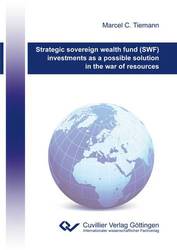| Areas | |
|---|---|
| Serie de libros (97) |
1382
|
| Nachhaltigkeit |
3
|
| Gesundheitswesen |
1
|
| Letra |
2377
|
| Medienwissenschaften | 16 |
| Teología | 57 |
| Filosofía | 102 |
| Derecho | 424 |
| Economía | 855 |
| Ciencias sociales | 418 |
| Ciencias del deporte | 48 |
| Psicología | 233 |
| Educación | 190 |
| Historia | 183 |
| Arte | 111 |
| Ciencias culturales | 166 |
| Literatur | 117 |
| Lingüística | 89 |
| Ciencias Naturales |
5408
|
| Ciencias Ingeniería |
1798
|
| General |
98
|
|
Leitlinien Unfallchirurgie
5. Auflage bestellen |
|
Erweiterte Suche
Strategic sovereign wealth funds (SWF) investments as a possible solution in the war of resources (Tienda española)
Is a strategic SWF investment an adequate instrument for national governments to secure access to critical raw material and energy inputs?
Marcel C. Tiemann (Autor)Previo
Lectura de prueba, PDF (110 KB)
Indice, PDF (37 KB)
This publication examines Europe’s strong dependency on importing essential minerals and metals for their industries and if a strategic European Union Sovereign Wealth Fund (EUSWF) is a possible solution for investing directly in producing countries in order to maximize the security of supply. This would be advanced measures for the “Raw Materials Initiative” (RMI) which has been launched by the European Commission in 2008 to react to the future development of minerals and metals which faced a scarcity based on natural limitation and increasing prices. Both are driven by a global shift from western economies to eastern economies based on booming economies and their high demand to satisfy the growth. The publication states that countries with a state capitalism have direct access to these relevant minerals and metals neither through their state-owned enterprises in their own economies nor through strategic foreign direct investments (FDI) in these elements by Sovereign Wealth Funds (SWFs) or state-owned enterprises, too. The results of the survey show that these economies are going to have or already have an advantage attributable to this behaviour and that the European Union (EU) missed this opportunity decades ago. Moreover does this way of political behaviour not coincide with the idea of a capitalist economic system, which is based on a free and fair trade. Finally, the EU seems to cooperate in this issue less than they should or might be able to. Indications were found related to the Europe 2020 strategy that the EU could overcome this weakness.
| ISBN-13 (Impresion) | 9783954040827 |
| ISBN-13 (E-Book) | 9783736940826 |
| Formato | A5 |
| Idioma | Inglés |
| Numero de paginas | 102 |
| Laminacion de la cubierta | mate |
| Edicion | 1 Aufl. |
| Lugar de publicacion | Göttingen |
| Fecha de publicacion | 22.06.2012 |
| Clasificacion simple | Tesis de master |
| Area |
Economía
Finanzas Economía política |
| Palabras claves | Finanzwissenschaft, Volkswirtschaftslehre, Sovereign Wealth Funds, global shift, foreign exchange reserves, investments, Europe 2020 strategy, natural resources, minerals and metals, state capitalism, foreign direct investments, exchange reserves, emerging markets, developing and transition economies, developed economies, capitalist system, socialist system |








